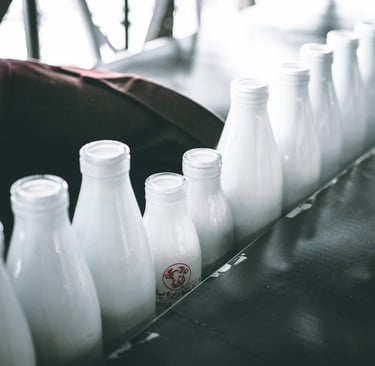Bones and dairy products: the truth


We still hear that children should drink milk every day...
... and consume enough dairy products throughout your life for good bone health and to avoid osteoporosis in the future.
Is this true? No!
First, milk is not a good source of calcium. On the one hand, because other foods provide more, and on the other, because it also contains things that are best limited or avoided: saturated fats, phosphorus, dioxins, antibiotics, and hormones. The best dietary sources of calcium are oily fish (400 mg calcium per 100 g), oilseeds (150 mg calcium per 100 g), yoghurts (100 mg calcium per 100 g), green vegetables (90 mg calcium per 100 g), eggs (50 mg calcium per 100 g) and citrus fruit (40 mg calcium per 100 g). In comparison, milk contains 125 mg of calcium per 100 g (these figures are averages).
Secondly, milk is acidifying, and an excessively acidic diet leads the body to draw calcium from the bones to counteract the acidic load.
Finally, calcium is not the only nutrient our body needs to build and maintain bone mass. We also need:
Vitamin D, which facilitates intestinal absorption of calcium.
Vitamin K2, which promotes the binding of calcium to the bone structure.
Silicon, which is also involved in calcium binding.
Zinc, which is involved in cell growth in general.
Magnesium, which "spares" calcium (it minimizes the entry of calcium into cells other than those of the bones and counteracts calcium deposits in the body other than in the bones, for example in the arteries) and is involved in collagen synthesis.
Vitamin B6, which promotes collagen framework strength and magnesium penetration into cells.
Vitamin C, necessary for collagen synthesis, resistance and plasticity.
Proteins, which account for about half the volume of our bones. Amino acids are best absorbed from vegetable proteins, as meat is particularly acidic (see the importance of acid-base balance later in this chapter). An excess of protein, especially animal protein, increases renal excretion of calcium.
Two other very important parameters for bone health are our body's acid-base balance and the ratio of calcium to phosphorus. The ideal ratio is 1.3; below 0.5, there is a risk of bone demineralization. For example, young people who eat processed foods and drink almost nothing but soft drinks are likely to develop early osteoporosis (unfortunately, this is becoming increasingly common).
Last but not least, we reach our peak bone mass around the age of 30. It is essential to maximize this peak with the right dietary intake.
In short, for good bone health and to avoid osteoporosis, we need to optimize our dietary intake of various nutrients, including calcium, particularly between birth and age 30. The best sources of calcium are oily fish, oilseeds, yoghurt, green vegetables, eggs, and citrus fruit. Lastly, we need to maintain our body's acid-base balance by favoring alkalinizing foods (vegetables and fruit) and going low on acidifying foods (meat, cheese, cereals, milk), and we need to avoid an imbalance between calcium and phosphorus by avoiding processed foods and soft drinks.
To find out more, also read these articles:
On drinks: https://isabellemaesnutrition.com/en/drinks
Milk bottles picture by Mehrshad Rajabi
